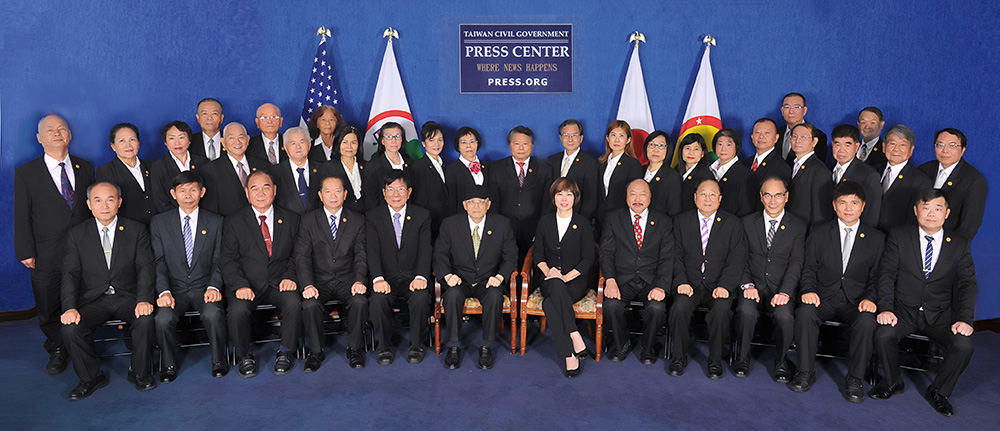活動寫真
中央活動 2019-08-28 2019 G7專刊/台灣民政府力求正常國際地位的台灣
2019在比亞里茨舉行的七國集團會議將重點關注減少全世界的不平等 - 這是一個值得稱讚的目標。為實現這一目標取得切實成果,七國集團應該首先尋求實際成果的首要地方之一是追求正常國際地位的台灣島嶼。
台灣有2500萬人口,是世界第22大GDP經濟體。他是美國第11大貿易夥伴,2018年貿易總額為760億美元(美國貿易代表),2018年台灣與歐盟之間的貿易額達到585億美元(歐盟委員會)。台灣是電信,電子,生物技術和化學品等行業的全球領導者。
一個台灣的政治和教育團體(TCG)正致力於國際認可和與世界更緊密的經濟聯繫。由受人尊敬的商人Roger Lin博士領導的台灣民政府(TCG)十多年來一直和平不懈地工作,以實現這一目標。
G7 meeting in Biarritz will focus on reducing inequality throughout the world – a commendable goal. One of the first places the G7 nations should look to achieve a tangible result to this end is the Taiwan islands with normal international status.
With 25 million people, Taiwan boasts the 22th largest economy in the world by GDP. It is the United States 11th largest trading partner with $76.0 billion in total goods traded in 2018 (US Trade Representative), and trade between Taiwan and the EU reached $58.5 billion in 2018 (European Commission). Taiwan is a global leader in industries such as telecommunications, electronics, biotechnology and chemicals. And, despite this robust economy, it is a nation not recognized by the G7, the United Nations or most of the countries of the world.
The inequality agenda put forth by French President Emmanuel Macron, states:
“Combating inequality within our societies and worldwide is a matter of justice, just as it is an urgent task we must address if we are to win back the trust of our citizens in our international governance system.”
Around the theme of inequality, the G7 will specifically address topics including poverty, healthcare, violence against women, gender equality, and exposure to climate change. In April when the foreign ministers of the G7 met in advance of the meeting, they also discussed protecting democracies addressing the issue of, “Strengthening our democracies in the face of new threats, mainly arising from the digital revolution and attempted foreign interference.” Taiwan faces these new threats every day.
The issue of Taiwan’s international recognition is complex to be sure. Most notably, it sits in a position of “strategic ambiguity,” due to the “One China Policy,” agreed to by the United States and China in 1979. The policy is still in place, but like many global dynamics that have been in place for decades it is starting to shift.
Chinese President Xi Jinping announced earlier this year the “one country, two systems” policy, which he directed at both Hong Kong and Taiwan. The policy has hit some roadblocks in Hong Kong, which is officially part of China with some legal exceptions. The inhabitants of Hong Kong hit the streets in mass protests recently over a proposed extradition law that would have made it easy for anyone accused of a crime in Hong Kong to be sent to mainland China for prosecution. This would open the door for trumped up charges of fraud or political crimes that would land people in the Chinese legal system, which does not equate to Western, democratic jurisprudence. The law was promulgated under the “one country, two systems,” as well, but it appears the protests have caused the Hong Kong authority to table the bill. Surely the nations of the G7 do not want to see Taiwan head in this direction.
In addition to the lack of diplomatic recognition, Taiwan is also denied access to free trade agreements, the World Health Organization and the International Civil Aviation Organization, where they should have every right to participate. The G7 can and should pursue a free trade agreement with Taiwan.
With 25 million people, Taiwan boasts the 22th largest economy in the world by GDP. It is the United States 11th largest trading partner with $76.0 billion in total goods traded in 2018 (US Trade Representative), and trade between Taiwan and the EU reached $58.5 billion in 2018 (European Commission).
One Taiwanese political and educational group is working for both international recognition and stronger economic ties to the world. The Taiwan Civil Government, headed by respected businessman Dr. Roger Lin, has worked peacefully and tirelessly for over 10 years to achieve this result.
The U.S. has a vital interest in cross-strait stability, and that can only be assured if the people of Taiwan believe they will not be overwhelmed economically by Beijing.
As Dr. Lin points out, Taiwan has close ties with both Japan and the United States that should serve as building blocks for future relations with all nations of the G7 and the world.
Relations with the United States in particular have improved dramatically in the last several years. The U.S. signed into law the Taiwan Travel Act, the Asian Reassurance Initiative Act and a $2 Billion arms deal is pending, including the sale of 108 M1A2 Abrams tanks. The U.S. built a much larger American Institute of Taiwan – a quasi-embassy in Taipei – and several high-ranking U.S. officials have recently visited Taiwan.
These are all positive developments, but they don’t go far enough. As President Macron quoted on the G7 website from the French Declaration of Rights of Man and Citizens, from the French Revolution. “Men are born and remain free and equal in rights.” Until Taiwan is recognized by the G7, the United Nations and the world, this fundamental freedom will be denied the people of Taiwan.
Editor’s Note
This material is produced by Global Vision Communications on behalf of the Taiwan Civil Government. Additional information can be found at the U.S. Department of Justice.
17203
